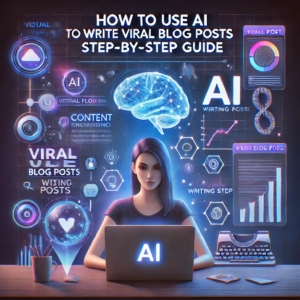How AI for Small Business is Transforming Operations: A Revolution in Efficiency
In today’s fast-paced digital landscape, AI for small business is transforming the way entrepreneurs operate, innovate, and grow their ventures.
This comprehensive guide delves into the world of AI automation and its profound impact on small businesses across various industries.
As we explore the power of intelligent systems, you’ll discover how these technologies are reshaping operations, boosting productivity, and paving the way for unprecedented success.
We strongly recommend that you check out our guide on how to take advantage of AI in today’s passive income economy.
Table of Contents
Understanding AI Automation for Small Business
AI for small business is more than just a buzzword; it’s a game-changing approach to running a company efficiently and effectively.
At its core, automation involves using technology to perform tasks with minimal human intervention, streamlining processes and making them faster and more efficient.
While automation doesn’t always require AI, the integration of artificial intelligence can significantly enhance these systems, taking them to new heights of capability and performance.
Consider a typical workflow in a small business setting.
Traditionally, many tasks would be handled manually, from data entry to customer communications.
Now, imagine a system where AI-powered tools handle these routine tasks automatically, freeing up valuable time and resources.
This is the essence of AI for small business – leveraging intelligent automation to transform operations from the ground up.
The Power of Low-Code and No-Code Platforms
One of the most exciting developments in AI for small business is the rise of low-code and no-code platforms.
These tools allow entrepreneurs and small business owners to harness the power of AI without extensive technical knowledge.
Platforms like Make.com (formerly Integromat) and Zapier have democratized access to sophisticated automation capabilities.
These platforms act as digital connectors, allowing businesses to integrate thousands of different applications seamlessly.
For example, a small marketing agency could use these tools to automate the creation and scheduling of social media posts, integrate customer data across multiple platforms, or even generate personalized email campaigns based on user behavior.
The possibilities are virtually endless, limited only by the imagination and needs of the business.
The Transformative Impact of AI for Small Business
The impact of AI for small business extends far beyond simple time-saving measures.
These intelligent systems are revolutionizing every aspect of small business operations, from customer service to financial management.
Let’s explore some key areas where AI for small business is making a significant difference:
Enhanced Efficiency and Productivity
AI for small business dramatically reduces the time spent on repetitive, administrative tasks.
Imagine a small marketing agency that typically dedicates 20 hours per week to data entry, lead tracking, and email management.
By implementing AI-powered automation solutions, this same agency could potentially reduce that time by 80%, freeing up a remarkable 64 hours per month for higher-value activities.
This shift allows small businesses to focus on strategic planning, content creation, and client engagement – activities that directly contribute to growth and innovation.
Improved Accuracy and Consistency
AI for small business introduces new levels of accuracy and consistency that are difficult to achieve manually.
Tasks like lead scoring, customer segmentation, and dynamic content personalization become infinitely more efficient and precise when powered by intelligent systems.
This improved accuracy not only saves time but also reduces costly errors and enhances the overall quality of work produced.
Scalability and Growth
One of the most significant advantages of AI for small business is its ability to scale operations without a proportional increase in costs or complexity.
As a small business grows, AI-powered systems can handle increased workloads without the need for additional staff or resources.
This scalability allows small businesses to compete more effectively with larger corporations, leveling the playing field in many industries.
Implementing AI for Small Business: A Step-by-Step Approach
Integrating AI for small business may seem daunting, but with a structured approach, it can be a smooth and rewarding process.
Here’s a step-by-step guide to help small businesses get started with AI automation:
1. Identify Inefficiencies and Opportunities
The first step in implementing AI for small business is to conduct a thorough audit of your current processes.
Look for repetitive tasks, bottlenecks, and areas where human error is common.
These are prime candidates for automation.
Create a visual map or flowchart of your business processes to identify where AI could have the most significant impact.
2. Choose the Right AI Tools and Platforms
With a clear understanding of your needs, research and select AI tools and platforms that align with your goals.
Consider factors like ease of use, integration capabilities, and scalability.
Remember, AI for small business doesn’t have to be complex – start with user-friendly platforms and grow from there.
3. Develop AI Workflows
Using platforms like Make.com or Zapier, start creating automated workflows for your identified tasks.
Begin with simple automations and gradually build more complex systems as you become more comfortable with the technology.
4. Integrate with Existing Systems
Ensure that your new AI for small business solutions integrate seamlessly with your existing tools and platforms.
This might include your CRM, accounting software, or project management tools.
A well-integrated system will maximize the benefits of AI automation.
5. Train Your Team
Introduce your team to the new AI for small business tools and processes.
Provide training and support to ensure everyone understands how to work with and benefit from the new systems.
6. Monitor and Optimize
Continuously monitor the performance of your AI automations.
Collect feedback from your team and look for opportunities to refine and improve your workflows.
Remember, implementing AI for small business is an ongoing process of optimization and improvement.
Real-World Applications of AI for Small Business
To truly understand the potential of AI for small business, let’s explore some practical applications across various industries:
Customer Service Automation
AI-powered chatbots can handle customer inquiries 24/7, providing instant responses to common questions and routing complex issues to human agents.
This not only improves response times but also allows small businesses to offer round-the-clock support without the need for a large customer service team.
Financial Management and Forecasting
AI for small business can revolutionize financial operations.
From automated invoicing and expense tracking to predictive cash flow analysis, these tools can provide small businesses with the financial insights typically reserved for larger corporations with dedicated finance departments.
Content Creation and Marketing
AI-powered tools can assist in generating marketing copy, creating social media posts, and even designing visual content.
This allows small businesses to maintain a consistent and engaging online presence without the need for a large marketing team.
Inventory Management
For small retailers or e-commerce businesses, AI can optimize inventory levels, predict demand, and automate reordering processes.
This reduces costs associated with overstocking and ensures products are always available when customers want them.
Personalized Customer Experiences
AI for small business enables hyper-personalization at scale.
By analyzing customer data and behavior, AI can help small businesses deliver tailored product recommendations, personalized email campaigns, and customized user experiences on their websites.
The Future of AI for Small Business
As we look to the future, the potential of AI for small business seems boundless.
Emerging technologies like natural language processing, computer vision, and advanced machine learning algorithms are opening up new possibilities for automation and innovation.
Small businesses that embrace these technologies today will be well-positioned to thrive in the increasingly digital and competitive landscape of tomorrow.
The key to success lies in staying informed, being willing to experiment, and continuously adapting to new technological advancements.
By leveraging the power of AI for small business, entrepreneurs and small business owners can focus on what truly matters – growing their business, serving their customers, and bringing their unique vision to life.
As we conclude this exploration of AI for small business, remember that the journey towards automation and AI integration is ongoing.
Stay curious, keep learning, and don’t be afraid to push the boundaries of what’s possible for your small business.
The future is intelligent, and with AI as your ally, your small business can achieve extraordinary things.
Frequently Asked Questions About AI for Small Business
How can AI be used for small businesses?
AI for small business can be applied in numerous ways to enhance operations and drive growth:
- Customer Service: Implement chatbots for 24/7 customer support.
- Marketing: Use AI tools for content creation, social media management, and personalized marketing campaigns.
- Data Analysis: Leverage AI to analyze customer data and market trends for informed decision-making.
- Financial Management: Automate bookkeeping, invoicing, and financial forecasting.
- Inventory Management: Optimize stock levels and automate reordering processes.
- Task Automation: Streamline repetitive tasks like email responses, scheduling, and data entry.
- Sales Optimization: Utilize AI for lead scoring, sales forecasting, and personalized product recommendations.
AI for small business is versatile and can be tailored to meet the unique needs of your company.
How much does AI cost for businesses?
The cost of AI for small business varies widely depending on the complexity and scale of implementation:
- Free Tools: Many AI-powered tools offer free tiers or trials, perfect for small businesses just starting with AI.
- Subscription-Based Services: Popular AI platforms for small businesses often range from $20 to $500 per month.
- Custom Solutions: Tailored AI implementations can cost anywhere from a few thousand to tens of thousands of dollars.
- Open-Source Options: Some AI tools are open-source and free to use, though they may require technical expertise to implement.
Remember, the cost of AI for small business should be weighed against the potential savings and revenue growth it can generate.
Start small with affordable solutions and scale up as you see results.
Can I use AI to make money online?
Absolutely! AI for small business can be a powerful tool for generating online income:
- E-commerce Optimization: Use AI to personalize product recommendations and optimize pricing strategies.
- Content Creation: Leverage AI writing tools to produce engaging blog posts, social media content, and marketing copy.
- Digital Marketing: Enhance your online advertising campaigns with AI-powered targeting and optimization.
- Online Tutoring: Utilize AI language models to assist in creating educational content or providing language practice.
- Virtual Assistant Services: Offer AI-enhanced virtual assistant services to other businesses.
- Data Analysis Services: Use AI tools to provide data analysis and insights as a service to other companies.
- AI-Powered Apps: Develop and sell AI-powered applications or chatbots for specific industries or tasks.
The key is to identify how AI can enhance your existing skills or business model to create new income streams online.
How to use AI to save your small business time and money?
AI for small business can significantly reduce costs and increase efficiency:
- Automate Routine Tasks: Use AI to handle repetitive tasks like data entry, appointment scheduling, and basic customer inquiries.
- Optimize Resource Allocation: Leverage AI-powered analytics to better understand where your time and money are best spent.
- Reduce Errors: AI can minimize costly mistakes in areas like financial management and inventory control.
- Enhance Customer Service: Implement AI chatbots to handle basic customer queries, reducing the need for a large support team.
- Improve Decision-Making: Use AI-driven insights to make more informed business decisions, potentially avoiding costly mistakes.
- Streamline Hiring Processes: AI can help screen resumes and identify top candidates, saving time in recruitment.
- Optimize Energy Use: For businesses with physical locations, AI can help manage energy consumption more efficiently.
- Predictive Maintenance: Use AI to predict when equipment might fail, allowing for proactive maintenance and avoiding costly breakdowns.
By strategically implementing AI for small business in these areas, you can significantly reduce operational costs and free up valuable time to focus on growth and innovation.
Remember, the key to success with AI is to start small, measure results, and gradually expand your use of AI tools as you see positive outcomes.

We strongly recommend that you check out our guide on how to take advantage of AI in today’s passive income economy.




